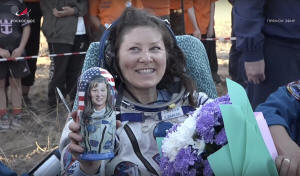2 record-breaking Russians and an American who lived on space station
for 6 months return to Earth
 Send a link to a friend
Send a link to a friend
[September 24, 2024]
MOSCOW (AP) — A Soyuz capsule carrying two Russians and one
American from the International Space Station landed Monday in
Kazakhstan, ending a record-breaking stay for the Russian pair.
The capsule landed on the Kazakh steppe about 3 1/2 hours after
undocking from the space station in an apparently trouble-free descent.
In the last stage of the landing, it descended under a red-and-white
parachute at about 7.2 meters per second (16 mph), with small rockets
fired in the final seconds to cushion the touchdown. |

In this photo taken from video released by Roscosmos space corporation,
the NASA astronaut Tracy Dyson holds a Russian traditional Matryoshka
wooden doll depicting her shortly after the landing of the Russian Soyuz
MS-25 space capsule carrying the NASA astronaut Tracy Dyson and the
Roscosmos cosmonauts Oleg Kononenko and Nikolai Chub, south-east of the
Kazakh town of Zhezkazgan, Kazakhstan, Monday, Sept. 23, 2024. (Roscosmos
space corporation via AP) |
|
The astronauts were to be extracted from the capsule and placed
in nearby chairs to help them adjust to gravity, then given
medical examinations in a nearby tent.
Oleg Kononenko and Nikolai Chub returned after 374 days aboard
the space station; on Friday they broke the record for the
longest continuous stay there. Also in the capsule was American
Tracy Dyson, who was in the space station for six months.
Eight astronauts remain in the space station, including
Americans Butch Wilmore and Suni Williams, who have remained
long past their scheduled return to Earth.
They arrived in June as the first crew of Boeing’s new Starliner
capsule. But their trip was marred by thruster troubles and
helium leaks, and the U.S. space agency NASA decided it was too
risky to return them on Starliner.
The two astronauts are to ride home with SpaceX next year.
All contents © copyright 2024 Associated Press. All rights
reserved |
|
|




